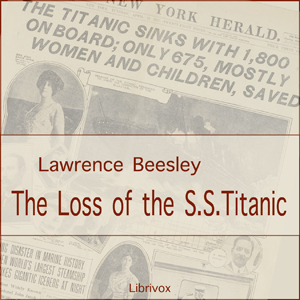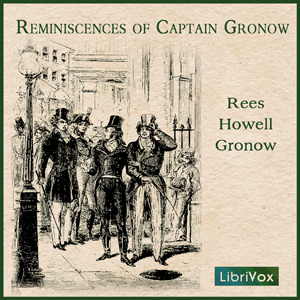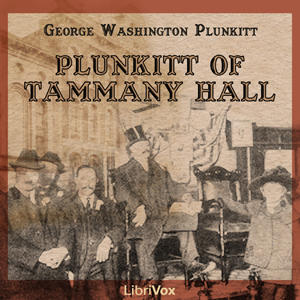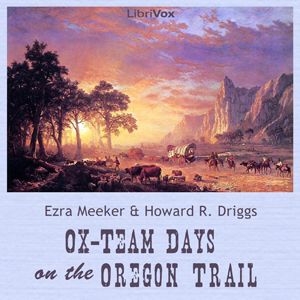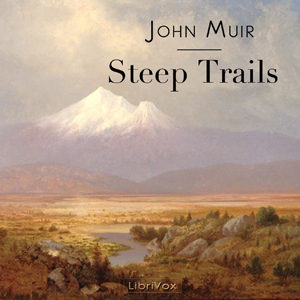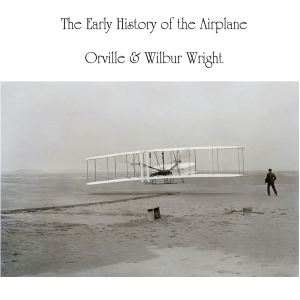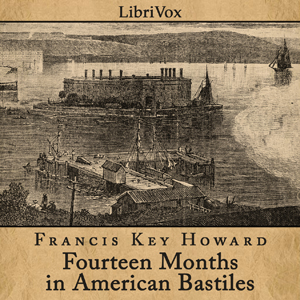'Roughing It In the Bush' is Susanna Moodie's account of how she coped with the harshness of life in the woods of Upper Canada, as an Englishwoman homesteading abroad. Her narrative was constructed partly as a response to the glowing falsehoods European land-agents were circulating about life in the New World. Her chronicle is frank and humorous, and was a popular sensation at the time of its publication in 1852. (Summary by Moira Fogarty)
34 episodes

The writer is as earnest in recommending ladies who belong to the higher class of settlers to cultivate all the mental resources of a superior education, as she is to induce them to discard all irrational and artificial wants and mere useless pursuits. She would willingly direct their attention to the natural history and botany of this new country, in which they will find a never-failing source of amusement and instruction, at once enlightening and elevating the mind, and serving to fill up the void left by the absence of those lighter feminine accomplishments, the practice of which are necessarily superseded by imperative domestic duties. To the person who is capable of looking abroad into the beauties of nature, and adoring the Creator through his glorious works, are opened stores of unmixed pleasure, which will not permit her to be dull or unhappy in the loneliest part of our Western Wilderness. The writer of these pages speaks from experience, and would be pleased to find that the simple sources from which she has herself drawn pleasure, have cheered the solitude of future female sojourners in the backwoods of Canada. Summary from book introduction
19 episodes
Roughing It is semi-autobiographical travel literature written by American humorist Mark Twain. It was authored during 1870–71 and published in 1872 as a sequel to his first book Innocents Abroad. This book tells of Twain's adventures prior to his pleasure cruise related in Innocents Abroad.(Wikipedia)
82 episodes
I have merely tried to make a written record of some of the hours I have lived through during the course of this war. A modest Lieutenant of Chasseurs, I cannot claim to form any opinion as to the operations which have been carried out for the last nine months on an immense front. I only speak of things I have seen with my own eyes, in the little corner of the battlefield occupied by my regiment. (Summary by the author)
8 episodes
The author, a British journalist and novelist, is interested in the feel of the places he visits. He describes at length a visit he has made to Egypt, with emphasis on the emotional response the places generate. (summary by Sibella)
23 episodes
The Cruise of the Snark (1913) is a memoir of Jack and Charmian London's 1907-1909 voyage across the Pacific. His descriptions of "surf-riding", which he dubbed a "royal sport", helped introduce it to and popularize it with the mainland. London writes:
Through the white crest of a breaker suddenly appears a dark figure, erect, a man-fish or a sea-god, on the very forward face of the crest where the top falls over and down, driving in toward shore, buried to his loins in smoking spray, caught up by the sea and flung landward, bodily, a quarter of a mile. It is a Kanaka on a surf-board. And I know that when I have finished these lines I shall be out in that riot of colour and pounding surf, trying to bit those breakers even as he, and failing as he never failed, but living life as the best of us may live it.
Excerpted from Wikipedia.
18 episodes
This is a 1st hand account written by a survivor of the Titanic about that fateful night and the events leading up to it as well as the events that followed its sinking. - Summary written by Allyson Hester
10 episodes
These pages record some of the adventures of the First South Carolina Volunteers, the first slave regiment mustered into the service of the United States during the late civil war. It was, indeed, the first colored regiment of any kind so mustered, except a portion of the troops raised by Major-General Butler at New Orleans. These scarcely belonged to the same class, however, being recruited from the free colored population of that city, a comparatively self-reliant and educated race. (From the text)
14 episodes
A short self portrait of Powys’ beliefs, temperament and peculiarities which prefigures his later, greater Autobiography. (Summary by Keri Ford)
18 episodes
In 1881, Mrs. Cecil Hall's brother went to Manitoba to farm. In 1882, she went out for a visit of some two months, and followed that visit with a long sojourn in Colorado, returning to England as the snows began to fall. While there, she had to give up her "Lady's ways" and help on the farm in many ways she'd never stoop to at home. She makes hay, cooks, paints the barn roof, and cleans. Through it all, the newness helped her keep her temper, and these letters home show an insight into the settlement of Western Canada. These letters have a feel of "Little House on the Prarie" from an English lady's point of view. (Summary by Sibella Denton).
38 episodes
Isabella Bird began travelling while in her early twenties to help alleviate illness that had plagued her since childhood. She was a single woman in her early forties when she made her treck through the Rocky Mountains. A Lady's Life in the Rocky Mountains details this fascinating account of her travels through a series of letters written to her sister, Henrietta. These letters are filled with beautiful, vivid descriptions of the scenery, the people she encountered, the way of life, and a mountain man named Jim Nugent, that was as rough as they come, but a complete gentleman with Ms. Bird. She has the distinction of being the first woman to become a member of the Royal Geographical Society in 1892. (Summary by Laura Caldwell)
23 episodes

Robert C. Leslie (1826-1901) was an artist and writer who, at an early age fell in love with the sea, the sea of Sail, not of Steam. He describes the progression of this love from wave to wave and boat to boat. Leslie sailed during the Great Age of Sail before Industrialism had taken possession of Britain.
Leslie comments on the early days of singlehanded small boat sailing:
"When I first began boating in the early forties [1840s], what is now called single-handed cruising was almost unknown among amateurs....people had a vague dread of it. Much of this has passed away, and hundreds of amateur boatmen, and even ladies, are now as much at home and really safer in a sailing-boat than they would be on the back of a hunter or bicycle."
Leslie writes of one of his favorite cruising grounds about 1850: "No railway in my time came within fifteen miles of Sidmouth, and the few enterprising visitors who reached there by coach from Exeter called it dull. It was certainly not a gay place, but most of those who resided there in that happy valley did so rather with a view to quiet, and among them it was rare to find any one disposed to tamper with the grave routine of country life there."
A Waterbiography captures a Lost Age.
(Summary by Peter Kelleher)
14 episodes
Au printemps 1336, François Pétrarque entreprend avec son frère l'ascension du mont Ventoux, qui, de ses 1912 mètres, domine le Comtat Venaissin et la Provence. C'est cette ascension et son pendant mystique que François Pétrarque relate, le jour même, dans une lettre datée du 26 avril, à son ami et confesseur Dionigi di Borgo San Sepolcro, lettre qui fut ensuite publiée sous le titre L'ascension du mont Ventoux. Le texte original est en latin. Il a été traduit en français en 1880 par Victor Develay. (de Aldor)
1 episodes

This is not a work of fiction! These are the actual memoirs of a legendary leader of partisans who bedeviled the Union army for years, almost within sight of the capitol. With only a few local men under command, John Singleton Mosby's ability to strike fast and then melt away before an effective pursuit could be organized kept the Yankee forces awake and often snarled in knots. With daring feats like capturing a Yankee general out of his bed within his defended headquarters, Mosby made his name a synonym for guerrilla warfare. Even today you can purchase in Middleburg, Virginia, a map showing "Mosby's Confederacy."
The mettle of the man may be judged by the enemies he kept. Said General Joseph Hooker, "I may here state that while at Fairfax Court House my cavalry was reinforced by that of Major-General Stahel. The latter numbered 6,100 sabres. . . . The force opposed to them was Mosby's guerrillas, numbering about 200, and, if the reports of the newspapers were to be believed, this whole party was killed two or three times during the winter. From the time I took command of the army of the Potomac, there was no evidence that any force of the enemy, other than the above-named, was within 100 miles of Washington City; and yet the planks on the chain bridge were taken up at night the greater part of the winter and spring."
Mosby outraged many of his Southern admirers after the war when he publicly endorsed General U.S. Grant for President. After an appointment as U.S. Consul to Hong Kong and a 16-year career with the Southern Pacific Railroad, he came to Washington as an assistant attorney in the Department of Justice. Loyal to the end to his commander, J.E.B. Stuart, Mosby also answered accusations that Stuart's grandstanding cost Lee the battle of Gettysburg.
22 episodes
A collection of memoirs about the Peninsular War, the Battle of Waterloo, and society and personalities of Regency London and 19th century Paris, by a sometime Grenadier Guards officer, unsuccessful parliamentarian, and dandy. Gronow displays some social attitudes of the day which would now be regarded as unacceptable, but is a clever raconteur who brings to life both the horrors of war and the gaiety of high society. (Summary by Ruth Golding and Wikipedia)
10 episodes
"I seen my opportunities and I took 'em.", George Washington Plunkitt of Tamminy Hall. There's good graft and bad graft according to Plunkitt. Listen to this candid discourse from a 19th century politician, and decide for yourself if things have changed.
(Summary by Mike Vendetti)
24 episodes

Cellini's autobiographical memoirs, which he began writing in Florence in 1558, give a detailed account of his singular career, as well as his loves, hatreds, passions, and delights, written in an energetic, direct, and racy style. They show a great self-regard and self-assertion, sometimes running into extravagances which are impossible to credit. He even writes in a complacent way of how he contemplated his murders before carrying them out. He writes of his time in Paris:
Parts of his tale recount some extraordinary events and phenomena; such as his stories of conjuring up a legion of devils in the Colosseum, after one of his not innumerous mistresses had been spirited away from him by her mother; of the marvelous halo of light which he found surrounding his head at dawn and twilight after his Roman imprisonment, and his supernatural visions and angelic protection during that adversity; and of his being poisoned on two separate occasions.
The autobiography is a classic, and commonly regarded as one of the most colourful; it is certainly the most important autobiography from the Renaissance.
Cellini's autobiography is one of the books Tom Sawyer mentions as inspiration while freeing Jim in The Adventures of Huckleberry Finn. (Summary adapted from Wikipedia by Karen Merline)
30 episodes

Roosevelt's popular book Through the Brazilian Wilderness describes his expedition into the Brazilian jungle in 1913 as a member of the Roosevelt-Rondon Scientific Expedition co-named after its leader, Brazilian explorer Cândido Rondon. The book describes all of the scientific discovery, scenic tropical vistas and exotic flora, fauna and wild life experienced on the expedition. One goal of the expedition was to find the headwaters of the Rio da Duvida, the River of Doubt, and trace it north to the Madeira and thence to the Amazon River. It was later renamed Rio Roosevel. Roosevelt's crew consisted of his 24-year-old son Kermit, Colonel Cândido Rondon, a naturalist sent by the American Museum of Natural History named George K. Cherrie, Brazilian Lieutenant Joao Lyra, team physician Dr. José Antonio Cajazeira, and sixteen highly skilled paddlers (called camaradas in Portuguese). The initial expedition started on December 9, 1913, at the height of the rainy season. The trip down the River of Doubt started on February 27, 1914.
During the trip down the river, Roosevelt contracted malaria and a serious infection resulting from a minor leg wound. These illnesses so weakened Roosevelt that, by six weeks into the expedition, he had to be attended day and night by the expedition's physician, Dr. Cajazeira, and his son, Kermit. By this time, Roosevelt considered his own condition a threat to the survival of the others. At one point, Kermit had to talk him out of his wish to be left behind so as not to slow down the expedition, now with only a few weeks rations left. Roosevelt was having chest pains when he tried to walk, his temperature soared to 103 °F (39 °C), and at times he was delirious. He had lost over fifty pounds (20 kg). Without the constant support of his son, Kermit, Dr. Cajazeira, and the continued leadership of Colonel Rondon, Roosevelt would likely have perished. Despite his concern for Roosevelt, Rondon had been slowing down the pace of the expedition by his dedication to his own map-making and other geographical goals that demanded regular stops to fix the expedition's position via sun-based survey.
Upon his return to New York, friends and family were startled by Roosevelt's physical appearance and fatigue. Roosevelt wrote to a friend that the trip had cut his life short by ten years. He might not have really known just how accurate that analysis would prove to be, because the effects of the South America expedition had so greatly weakened him that they significantly contributed to his declining health. For the rest of his life, he would be plagued by flareups of malaria and leg inflammations so severe that they would require hospitalization.
The racial attitudes reflected in Roosevelt's American history do not seem to carry over into his attitude toward the native Americans he encounters on this trip, although his enthusiastic anticipation of the development of the virgin wilderness he is crossing may be jarring to some contemporary readers. (Summary adapted from Wikipedia by Karen Merline.)
36 episodes
This autobiographical work describes the author's harrowing experience caught on a small drifting piece of ice, while crossing a frozen bay by dog team on the Northern Peninsula of Newfoundland. (Summary by Sean Michael Hogan)
3 episodes
A collection of letters from Anne (MacLanahan) Grenfell, future wife of Sir Wilfred Grenfell, regarding her year of missionary service at the orphanage in St. Anthony, Newfoundland and Labrador, Canada. (Summary by Sean Michael Hogan)
7 episodes
Mary Boykin Miller Chesnut, a well-educated South Carolina woman who was married to a Confederate general, kept extensive journals during the Civil War. Mrs. Chesnut moved in elite circles of Southern society and had a keen interest in politics. Her diary is both an important historical document and, because of her sharp wit and often irreverent attitude, a fascinating window into Southern society of the time. This recording is of the first published edition of the diary, edited by Isabella D. Martin and Myrta Lockett Avary and compiled from Mrs. Chesnut's revisions of her original journals. (Summary by Laurie Anne Walden)
41 episodes
Aus meinem Leben. Dichtung und Wahrheit ist eine zwischen 1808 und 1831 entstandene Autobiographie, in der Johann Wolfgang von Goethe seine Erlebnisse aus den Jahren 1749 bis 1775 liebevoll darstellt. Nach Richard Friedenthal ist diese mannigfaltig vorschreitende Lebensgeschichte einer der großen deutschen Romane - ein Hausbuch. (Zusammenfassung von Wikipedia)
107 episodes
A Voyage to the South Sea, undertaken by command of His Majesty, for the purpose of conveying the Bread-fruit tree to the West Indies, in His Majesty’s ship The Bounty, commanded by Lieutenant William Bligh. Including an account of the Mutiny on board the said ship, and the subsequent voyage of part of the crew, in the ship’s boat, from Tofoa, one of the Friendly Islands, to Timor, a Dutch settlement in the East Indies. (Summary is the full title)
21 episodes
P. T. Barnum exposes some of the chief humbugs of the world with his usual entertaining style. He looks at medicine and quacks, ghosts, witchcraft, religious humbugs, money manias, adventurers, personal reminiscences, and much more. (Summary by Barry Eads)
51 episodes
This is a memoir by an early 19th Century American settler in the Pacific Northwest. (Description by BellonaTimes)
30 episodes

"Early in the summer of 1860, I had an attack of gold fever. In Chicago, the conditions for such a malady were all favorable. Since the panic of 1857 there had been three years of general depression, money was scarce, there was little activity in business, the outlook was discouraging, and I, like hundreds of others, felt blue." Thus Chalkley J. Hambleton begins his pithy and engrossing tale of participation in the Pike's Peak gold rush. Four men in partnership hauled 24 tons of mining equipment by ox cart across the Great Plains from St. Joseph, Missouri, to Denver, Colorado. Hambleton vividly recounts their encounters with buffalo herds, Indians, and"the returning army of disappointed gold seekers." Setting up camp near Mountain City, Colorado, Hambleton watched one man wash "several nice nuggets of shining gold" from the dirt and gravel, only to learn afterwards that "these same nuggets had been washed out several times before, whenever a 'tenderfoot' would come along, who it was thought might want to buy a rich claim." Two years later, "tired and disgusted with the whole business," Hambleton returned to Chicago, where he arrived "a wiser if not richer man." In later years, Hambleton was a prominent Chicago lawyer, real estate developer, and a member of the Chicago Board of Education. He wrote this candid account for family and friends, publishing it privately in 1898. It is based in good part on letters he had sent from the gold fields to his sister. Summing up his experience with wry humor, he writes: "After selling out my interest in the joint enterprise, I still had left some fifty claims on various lodes . . . Some time after returning to Chicago, I was making a real estate trade . . . and I threw in these fifty gold mines. . . Had I only kept them, and gotten up some artistic deeds of conveyance, in gilded letters, what magnificent wedding presents they would have made. . . In the long list of high-sounding, useless presents, the present of a gold mine would have led all the rest." (Summary by Sue Anderson)
3 episodes
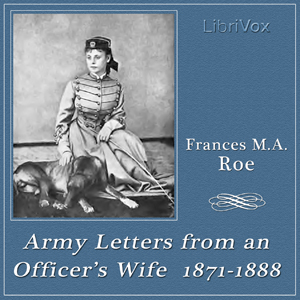
"There appeared from the bushes in front of me, and right in the path, two immense gray wolves . . . Rollo saw them and stopped instantly, giving deep sighs, preparing to snort, I knew . . . To give myself courage, I talked to the horse, slowly turning him around . . . when out of the bushes in front of us, there came a third wolf! The situation was not pleasant and without stopping to think, I said ‘Rollo, we must run him down - now do your best’ and taking a firm hold of the bridle, and bracing myself in the saddle, I struck the horse with my whip and gave an awful scream. . .” Thus, the spunky and resourceful Frances Roe recounts one of her many adventures. Frances was the young wife of a West Point Army officer, whose career took them both to frontier garrisons in what are now the states of Kansas, Colorado, Oklahoma, Utah, Montana, and Wyoming. Her letters home to her family in upstate New York, written between 1871 and 1888, and published in book form in 1909, are a fascinating chronicle of life on the frontier. Despite the grittiness of keeping house in tent-and-log-cabin quarters, Frances took to Western life, learning to shoot and ride (side saddle), fly fish for trout and hunt buffalo. Her letters, chatty and detailed, open windows on varied aspects of frontier and army life: army protocol (including the right of senior officers to bump subordinates out of their housing ); the Indian tribes--Arapahoe, Cheyenne, Apache, Kiowa (ceremonial visits from chiefs as well as Indian warfare); the black cavalry troops (at Camp Supply in Indian Territory); Chinese cooks (also Polish, Irish, and enlisted men doing kitchen duty). Her letters span years of rapid change in the West. They touch on the disappearance of the buffalo herds, the decline of the Indian tribes and the coming of the railroads. Even Yellowstone Park, established in 1872, gets a mention: “Now that the park can be reached by railroad, all of the generals, congressmen, and judges are seized with a desire to inspect it--in other words, it gives them a fine excuse for an outing at Uncle Sam’s expense.”Her emotions run deep when she writes: “I love army life here in the West, and I love all the things that it brings to me--the grand mountains, the plains, and the fine hunting.” But, Frances’ husband, Fayette Washington Roe, is eventually promoted to a headquarters desk job. Frances tries to evinse enthusiasm for town life: “since I cannot return to the plains, I might as well go to the city, where we will meet people of culture.” But even shopping for the necessary clothes distresses her: “Parasols have bothered me. I would forget to open them in the street, and would invariably leave them in the stores when shopping and then have to go about looking them up.” She then utters a timeless cry of urban angst: “It is the feeling of loneliness I mind here--of being lost and no one to search for me.” (written at a hotel in Omaha, Nebraska in August 1888) Anyone with nostalgia for or curiosity about the Old American West will certainly enjoy this book. (Summary by Sue Anderson)
22 episodes
Short memory of boyhood by a little-known American poet based in Carmel-By-The-Sea, California. (Summary by BellonaTimes)
13 episodes
A collection of Muir's previously unpublished essays, released shortly after his death. "This volume will meet, in every way, the high expectations of Muir's readers. The recital of his experiences during a stormy night on the summit of Mount Shasta will take rank among the most thrilling of his records of adventure. His observations on the dead towns of Nevada, and on the Indians gathering their harvest of pine nuts, recall a phase of Western life that has left few traces in American literature. ... The landscapes that Muir saw ... will live in good part only in his writings, for fire, axe, plough, and gunpowder have made away with the supposedly boundless forest wildernesses and their teeming life." (From the Editor's note to the 1918 first edition)
25 episodes
In 1898, during the construction of river-crossing bridge for the Uganda Railway at the Tsavo River, as many as 135 railway workers were attacked at night, dragged into the wilderness, and devoured by two male lions. The Man-Eaters of Tsavo is the autobiographical account of Royal Engineer Lt. Col. J.H. Patterson's African adventures. Among them, his hunt for the two man-eaters.
This book was the basis for the 1996 film The Ghost and the Darkness.
(Summary by James Christopher)
28 episodes
Thornton Chase is commonly recognized as the first convert to the Bahá'í Faith of Occidental background. During his life he organized many Bahá'í activities in Chicago and Los Angeles and was considered a prominent Bahá'í. In 1907 Chase was able to go on pilgrimage. Though Chase was able to be with `Abdu'l Bahá in Akka for only three days, the experience transformed him. `Abdu'l Bahá, highly impressed by Chase's qualities, conferred on him the title Thábit, "steadfast." On returning home Chase wrote an account of his pilgrimage, which was published under the title In Galilee] in 1908. The short work gives a detailed and poignant description of `Abdu'l-Bahá's home and family in Akka, as well as a moving description of `Abdu'l-Bahá Himself. The work remains one of the most important examples of the genre commonly known as pilgrim's notes.
(Summary by Wikipedia)
9 episodes
“Thus I have acted; these were my thoughts; such was I.”
Rousseau’s lengthy and sometimes anguished dossier on the Self is one of the most remarkable and courageous works of introspection ever undertaken. Some readers may be repelled by his tendency to revel in embarrassing accounts of humiliation and fiasco, as if he were striving too hard to achieve an ultimate nakedness, a nakedness of the soul perhaps. Others may recall the compulsive self-searching of the narrator of Proust’s A la recherche du temps perdu, who also rather dwelt on the co-existence in the individual of the vile and the virtuous.
The two opening volumes of the Confessions, presented in this inevitably censored edition of 1903, deal with the author’s childhood and callow adolescence.
Here he is... (Summary by Martin Geeson)
18 episodes

“Beasts, Men and Gods” is an account of an epic journey, filled with perils and narrow escapes, in the mold of “The Lord of the Rings.”
The difference is: it’s all true.
Ferdinand Ossendowski was a Pole who found himself in Siberia and on the losing side during the Bolshevik Revolution. To escape being rounded up and shot, he set out with a friend to reach the Pacific, there to take ship back to Europe. During his journey he fell in with dozens of other military men who shared the same objective… but nearly every one of them perished on the way.
It’s up to you to decide whether Ossendowski was threatened most by the beasts, by the men, or by the gods, or indeed, by the severe and uncompromising landscapes of Siberia, Mongolia, and China. That he survived at all seems improbable. The mystical mysteries and magics of Buddhism, “The Yellow Faith”, were woven about and through his sojourn and had no little part in his survival. Time after time he was put in the delicate position of being the bargainer between warring groups, and ultimately, only incredible luck and his friendship with the Hutuktu of Narabanchi Monastery saw him through.
When published in the United States, this book caused a sensation and became a best-seller. (Summary by Mark F. Smith)
36 episodes
“The smallest, the most trifling pleasure that is conveniently within my reach, tempts me more than all the joys of paradise.”
Here again is the youthful, hero-worshipping Jean-Jacques – displaying an emotional immaturity that leads him into picaresque escapades in the company of transients and misfits, always ending in reunion with mother-surrogate Madame de Warens.
In a literally unprecedented gesture of self-revelation, Rousseau opens Volume 3 exposing himself indecently in dark alleyways. This 1903 edition fails to appreciate the humorous strangeness of the passage and removes it to protect the reader.
(Summary by Martin Geeson)
18 episodes

Major John Graham Gillam, British Supply Officer, wrote in his World War I Gallipoli Diary that when he sailed from England for the Dardanelles in March, 1915, he had visions of “trekking up the Gallipoli Peninsula with the Navy bombarding a way for us up the Straits and along the coast-line of the Sea of Marmora, until after a brief campaign we entered triumphantly Constantinople, there to meet the Russian Army, which would link up with ourselves to form part of a great chain encircling and throttling the Central Empires. . . We little appreciated the difficulties of the task,” he continues, in potent understatement.
Gillam’s charge was shepherding supplies--food and munitions--from beach depots to the trenches for a brigade of 4000 men. Since it was his first experience with “real war,” he decided to keep a diary, which he did from the day he landed at Gallipoli (April 25, 1915) until he was evacuated at the end of the campaign in January 1916. He aptly states in the preface to the published version of his diary: “those who desire to survey the whole amazing Gallipoli campaign in perspective must look elsewhere than in these pages. Their sole object was to record the personal impressions, feeling, and doings from day to day of one supply officer to a Division whose gallantry in that campaign well earned for it the epithet “Immortal.”
As the campaign intensifies, Gillam’s entries mature. Early on (May 30), a sample entry: “This afternoon I ride . . . to Morto Bay, and on the way have a delightful cross-country canter. I have difficulty, though, in making my mare jump trenches. She jumped hurdles at Warwick race-course like a bird.” A month later, on June 30, “The smell of dead bodies is at times almost unbearable in the trenches, and chloride of lime is thrown over them. I know of no more sickly smell than chloride of lime with the smell of a dead body blended in.” Another month, and respect for the Turks, and also for the rugged terrain of the peninsula is evident (August 29): “Behind me, purple Turkish hills, every point of which is held by the enemy. Then in between our line and the hills the scrubby low-lying country. . . I look at it hopelessly--for I know now, as we all do, that the conquest of the Peninsula is more than we can hope for. All that is left to us is to hang on day by day. . . Death in various forms walks with us always . . .”
Today, the Turkish Government maintains a war memorial and cemeteries at the Gallipoli Peninsula Historical National Park. Memories are very much alive there. Preserved trenches and the sad graves of many, many soldiers from both sides of the conflict are made especially poignant by the beauty of the setting-- the sea and high hills beyond.(Summary by Sue Anderson)
24 episodes
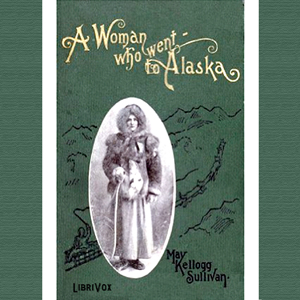
Alaska has only been a state since 1959, and the breathtaking terrain remains mostly unspoiled and natural. In modern times, many of us have had the pleasure of visiting Alaska via a luxurious cruise ship, where we enjoyed gourmet meals, amazing entertainment, and a climate-controlled environment. It's easy to also book a land package that enables you to see more of the country by train.Imagine what it was like to visit the same wild, untamed countryside in 1899. Instead of boarding a sleek, stylish cruise ship, you travel for weeks on a steamer. You wait 2 weeks for the open, flat cars of the new railrod just to assure yourself it can travel safely through the dangerous mountain pass. No stately cabin or grand hotel awaits you at the end of your journey; you'll spend your time in rough mining camps. Such is the case in May Kellogg Sullivan's spellbinding and vivid account of her Alaskan adventures, which occurred over 18 months during 2 solo trips covering 12,000 miles. This is the perfect travel narrative to enjoy on your Alaskan cruise or in the comfort of your own home. (Introduction by Karen Commins)
28 episodes
In 1879 John Muir went to Alaska for the first time. Its stupendous living glaciers aroused his unbounded interest, for they enabled him to verify his theories of glacial action. Again and again he returned to this continental laboratory of landscapes. The greatest of the tide-water glaciers appropriately commemorates his name. Upon this book of Alaska travels, all but finished before his unforeseen departure, John Muir expended the last months of his life. (Summary by William Frederic Bade)
21 episodes
The Brothers Orville and Wilbur Wright made the first controlled, powered and sustained heavier-than-air flight, on 17th December 1903. They were not the first to build and fly aircraft, but they invented the controls that were necessary for a pilot to steer the aircraft, which made fixed wing powered flight possible. The Early History of the Airplane consists of three short essays about the beginnings of human flight. The second essay retells the first flight: This flight lasted only 12 seconds, but it was nevertheless the first in the history of the world in which a machine carrying a man had raised itself by its own power into the air in full flight, had sailed forward without reduction of speed and had finally landed at a point as high as that from which it started. (Introduction by Availle)
3 episodes

This is not a children's book, as may be supposed from the title, but a collection of essays first published in The Idler magazine, in which over twenty well-known authors write with characteristic style and humour of their experiences in writing their first book... and getting it published.Authors include Jerome K. Jerome, R. L. Stevenson, Bret Harte, Rider Haggard, Rudyard Kipling, Conan Doyle and Mary Braddon. Full of charm, humour and pathos, this book is like a fireside chat with great writers of the past, as well as being a fascinating insight into the literary scene of the late 19th century.The listener is warned that a few of the authors give away the ending of their book, especially when they were pressurised into changing it by the publisher..Here are links to online texts of the works discussed, where available: Ready-Money Mortiboy;
The Family Scapegrace;
The Wreck of the ‘Grosvenor’;
Physiological Aesthetics;
Philistia;
The Shadow of a Crime;
Departmental Ditties;
The Trail of the Serpent;
The House of Elmore;
Dawn;
Hudson Bay;
The Premier and the Painter;
The Western Avernus;
A Life’s Atonement;
A Romance of Two Worlds;
On the Stage and Off;
Cavalry Life;
Dead Man’s Rock;
Undertones;
Idyls and Legends of Inverburn;
Treasure Island
(Summary by Ruth Golding)
23 episodes
"She was more to me than a sister, a mother, a friend, or even than a mistress, and for this very reason she was not a mistress; in a word, I loved her too much to desire her..."More of the amours of the twentysomething Jean-Jacques: here initiated into a strangely compromised manhood by his "maman" and perennial comforter -"Was I happy? No: I felt I know-not-what invincible sadness which empoisoned my happiness, it seemed that I had committed an incest, and two or three times, pressing her eagerly in my arms, I deluged her bosom with my tears. On her part, as she had never sought pleasure, she had not the stings of remorse..."(Introduction by Martin Geeson)
20 episodes

Henry Ford profiles the events that shaped his personal philosophy, and the challenges he overcame on the road to founding the Ford Motor Company. Throughout his memoir, he stresses the importance of tangible service and physical production over relative value as judged by profits and money. He measures the worth of a business or government by the service it provides to all, not the profits in dollars it accumulates. He also makes the point that only service can provide for human needs, as opposed to laws or rules which can only prohibit specific actions and do not provide for the necessaries of life. Ford applies his reasoning to the lending system, transportation industry, international trade and interactions between labor and management. For each, he proposes solutions that maximize service and provide goods at the lowest cost and highest quality. He analyzes from a purely material viewpoint, going as far as to argue that the need for a good feeling in work environments may reflect a character flaw or weakness. However, his unflinching focus on the ultimate material products and necessities of life provide clever insights in how he created an efficient and flexible system for providing reliable transportation for the average person. (Summary by LivelyHive)
20 episodes

Jane Addams was the first American woman to be awarded the Nobel Peace Prize. In a long, complex career, she was a pioneer settlement worker and founder of Hull-House in Chicago, public philosopher (the first American woman in that role), author, and leader in woman suffrage and world peace. She was the most prominent woman of the Progressive Era and helped turn the nation to issues of concern to mothers, such as the needs of children, public health and world peace. She emphasized that women have a special responsibility to clean up their communities and make them better places to live, arguing they needed the vote to be effective. Addams became a role model for middle-class women who volunteered to uplift their communities. This recording of her memoir Twenty Years at Hull-House commemorates the 100th anniversary of its publication, the 150th anniversary of Addams' birth, and was released on December 10th, the anniversary of Addams receiving her Nobel Prize. (Summary by Wikipedia and Elizabeth Klett)
19 episodes
Francis Key Howard recounts in this book his life as a political prisoner of the United States. He points out that he was held captive at the same location where his grandfather was inspired to write the national anthem about the "land of the free," which makes a very stunning contrast. The sufferings that were imposed on him by the Union forces had the effect of solidifying his determination to resist unjust governmental dictates. (Introduction by Katie Riley)
9 episodes
Described by some as one of the greatest escape books published. The Escaping Club recounts Evans' escape to Switzerland from a supposedly "escape-proof" German prison camp during World War I. After repatriation and rejoining the war, Evans again finds himself captured, this time first by Arabs and then by Turks. He again manages to escape. A detailed look at the trials faced by Allied POWs during World War I. (Summary by Tom Weiss)
23 episodes
Ki no Tsurayuki was a Japanese waka poet of the Heian period. In 905, he was one of the poets ordered to compile the "Kokinshu - Collected Japanese Poems of Ancient and Modern Times". He is also one of the Thirty-six Poetry Immortals of Japan.
The Tosa Diary, written in 935, is considered the major work of Ki. It is an account of his return to the capital Kyoto from Tosa province, where he had served as governor since 930. The journey is by boat, and Ki no Tsurayuki tells about his sea sickness and fear of pirates, his impressions of the coast, and the various offerings to placate the gods of the sea. The Tosa Diary is written entirely in kana (the women's alphabet) and contains many poems composed by Ki during the journey.
6 episodes
Gurudev Rabindranath Tagore talks of the many things he feels is necessary for creativity through joy of unity, he covers many topics like the creative ideal, makes comparisons of creativity between the east and the west, the spirit of freedom and about his idea of an University. (Summary by sidhu177)
11 episodes

Phoebe Yates Pember served as a matron in the Confederate Chimborazo military hospital in Richmond, Virginia, during the Civil War, overseeing a dietary kitchen serving meals to 300 or more wounded soldiers daily. Reminiscences of a Southern Hospital is her vivid recounting of hospital life and of her tribulations (and personal growth) as a female administrator. To follow her from day one, when she is greeted with “ill-repressed disgust” that “one of them had come,” and she, herself, “could only understand that the position was one which dove-tailed the offices of housekeeper and cook” to the day when she as exerts control over the hospital’s “medicinal whiskey barrel” is to watch a woman find herself. Besides describing “daily scenes of pathos,” Pember gives a horrifying account of the prisoner exchange of November 1864 (“living and dead . . . not distinguishable”), and also of the evacuation and burning of Richmond in 1865. Her memoirs were serialized in Cosmopolite magazine in 1866, then reprinted in book form in 1879 under the title A Southern Woman’s Story. Pember was honored by the US Postal Service with a stamp in 1995. (Summary by Sue Anderson)
9 episodes

Station Life in New Zealand is a collection of cheerful and interesting letters written by Lady Mary Anne Barker (nee Mary Anne Stewart) that is a New Zealand "classic". These letters are described in the Preface as "the exact account of a lady's experience of the brighter and less practical side of colonisation". The letters were written between 1865 and 1868 and cover the time of her travel with her husband (Frederick Broomie) to New Zealand and life on a colonial sheep-station at their homestead "Broomielaw", located in the Province of Canterbury, South Island of New Zealand. Although these letters are written with great humour and fine story telling, her life was marred by tragedy while in Canterbury through the illness and eventual death of her baby son.The first four ships of settlers that colonised the Canterbury region had only arrived in 1850. Consequently, little was known about, for example, the irregular Canterbury weather patterns that would dominate the lives of Lady Barker and her husband for those three short years. She describes the regular predations of the Canterbury nor'wester (a type of Fohn wind), including its role in completely blowing away her attempts at establishing a croquet lawn, the devastating effects of snow storm that killed over half of their sheep, and of a great flood that not only flooded Christchurch but demolished her poultry and nearly drowned her husband.Lady Mary Anne Barker was a strong horse woman and very keen for all sorts of "adventures". She describes instigating a bitterly cold late autumn overnight camping trip to the top of their nearest hill, Flagpole, followed the next morning by a serene sunrise over the Canterbury plains. In other letters, she describes her pride and enjoyment at joining and keeping up with nine men, who doubted her abilities, for long hours of walking in untracked, untamed bush with the aim of hunting wild cattle; and her joy at setting ablaze the tussock grasslands on their sheep station in spite of the risk to her eyelashes. As one of the few women in her part of Canterbury at the time, she also helped provide the neighbourhood with books to read, and baptism and schools for children. Lady Mary Anne Barker and her husband returned to England at the end of 1868. (Summary by Gail Timmerman-Vaughan)
25 episodes
A comic dialogue written in John Collier's idiosyncratic version of the 18th century South Lancashire dialect together with a collection of 19th century texts on Collier and his work. Egged on by Meary (Mary), Tummus (Thomas) recounts the series of misadventures that ensue when he makes a trip to Rochdale on an errand for his master. First published in 1746, the text grew over subsequent editions as Collier expanded the story, added a preface in which he berates publishers who had pirated his work, and inflated and amended his glossary. The text read here is the final version of the preface, dialogue and glossary, which appeared in an 1862 edition of Collier's works. Collier's texts are followed by several accounts of Collier's life and commentaries on his work, Elijah Riding's 1860 'plain English' translation of the Tummus and Meary text, and three poems set at Collier's graveside in Rochdale. (Summary by Phil Benson)
20 episodes
The publishers believe that a picture of a life sketched by a master hand-somebody who stands in the world of crime as Edison does in his field or Morgan and Rockefeller do in theirs-could not fail to be impressive and valuable and prove the oft repeated statement that crime does not pay.
Such a person is Sophie Lyons, the most remarkable and the greatest criminal of modern times. This extraordinary woman is herself a striking evidence that crime does not pay and that the same energy and brains exerted in honest endeavor win enduring wealth and respectability. (From the Introduction)
13 episodes






